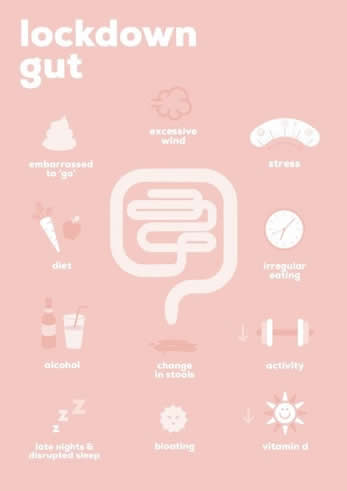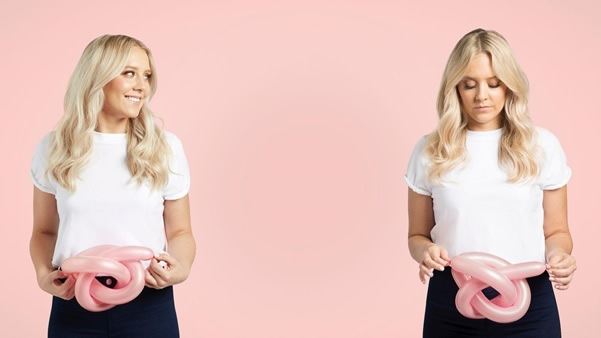Positive Health Online
Your Country

What’s Lockdown Gut to do With It? – the Gut Stuff
by Lisa and Alana Macfarlane(more info)
listed in colon health, originally published in issue 268 - February 2021
Even as we are emerging out of lockdown, a lot of us are going to continue to spend more time at home than ever before – and this adjustment to a new way of life is likely to have taken its toll on our guts. With the world navigating new challenges and stresses brought on by COVID-19, it’s likely that that we will have slipped into irregular sleep patterns, experienced more anxiety and uncertainty for the future, and laxer eating habits – along with getting less vitamin D and physical activity than we need.

Lisa and Alana Macfarlane, Founders of the first platform of its kind The Gut Stuff – a community of ‘gut pros’ including scientists, academics, dieticians, nutritionists and foodies committed to changing the health, wellness and food industry, and backed by over 79K Instagram followers – have been inundated with queries as to why our insides have been behaving differently over the past few months – so they’ve called on doctors, dieticians and nutritionists to help you better understand and support you though the gut, the bad and the ugly of lockdown with seven simple steps that everyone can take (alongside following national guidance for preventing and spreading COVID-19), to start taking better care of your guts at home.
.jpg)
What’s Lockdown Gut to do With It?
1. Managing Mental Health
On the pandemic, the World Health Organization has stated that “In public mental health terms, the main psychological impact to date is elevated rates of stress or anxiety”.
Whether your stress/anxiety surrounds family, working/not working, childcare, getting ill or just generally heightened emotions, everyone has been affected in some way. What’s that got to do with your gut? Plenty – your gut and brain are chemically connected along the Gut/Brain axis (or the GBA for short)
The GBA’s role is to keep tabs on how the gut is functioning as well as linking your cognitive and emotional parts of your brain with your gut. A great example of this in practice is feeling butterflies in your gut if you are nervous/anxious. Your gut and brain chat use different ways of communicating with each other, so what goes on in your gut, where ‘happy hormones’ serotonin and dopamine are made, has an effect on your mind, and vice versa. Stress and anxiety can negatively affect sleep, appetite and food choices and your gut microbes and how your gut physically works.
What can you do at home: Work on ways to reduce stress and anxiety where you can and keep a diary to see if you can link symptoms to how you are feeling. We have diaries perfect for this in our shop. Try yoga, meditation, getting out for a walk or speaking to a pal – do what works for you. AnxietyUK also has some great resources on how to manage anxiety at this time.
2. Getting your Vitamin D
Your body is incredible – it makes Vitamin D (actually a hormone not a vitamin) when you are exposed to sunlight containing UVB rays (in the UK from March to October), small amounts are absorbed in the small intestine from food. But with the extra time we’ve been spending inside, we aren’t getting exposed to as much sunlight as we normally would during these warmer months. What has this got to do with gut health? Vitamin D plays a vital role in how we absorb and regulate calcium, which is a crucial mineral for our digestive enzymes. It also has the power to change the make-up of microbes in your gut, plays a key part in keeping your gut lining and immune system in good working order.
What can you can do at home: As we are now inside a lot more, the NHS now recommends 10 micrograms of vitamin D a day. Other things you can do include getting outside for exercise or walking when you can. The amount of vitamin D you make depends on skin colour and how much skin is exposed to the sunlight – so there’s no definitive answer. Always look after your skin in the sun to reduce the risk of skin cancer.
3. Feeling Embarrassed to ‘Go’
House mates, family or even your cat. Feeling awkward about using the toilet for a poo while others are in the house is completely normal (just like holiday constipation) BUT holding on until no one is around isn’t going to do you any favours and can result in constipation.
What you can do at home: Try to do what you can to make yourself relaxed, try putting on music or a podcast on your phone, open a window if you have one and remember, everyone poos! In Japan, most toilets have the option of music or nature sounds for this very reason!

4. Irregular Sleeping Patterns
With less routine, it is easy to stay up late watching our favourite programme or hitting the snooze button just a few too many times. But what does irregular sleep have to do with your gut? Is your gut affecting your sleep or is your sleep affecting your gut? It’s a two-way street. Poor sleep has the power to negatively impact the effectiveness and function of our gut microbes and our gut microbes can disrupt the production and conversion of the neurotransmitters needed to help us have a good night’s sleep.
Around 90% of your serotonin (the precursor to melatonin – your sleep regulating hormone) is made in your gut. If your gut is out of whack, this can affect how much serotonin is produced and you might find it tricky to sleep. If you are waking up and going to bed at all sorts of times, this is going to disrupt your gut microbes, who, just like you, work on a day / night cycle – some do their jobs in the day and others work best at night.
What you can do at home: work on your sleep hygiene, set regular bed and wake up times, no screens the hour before bed and expose yourself to natural light in the morning. Lastly, avoid stimulants from the afternoon onwards (that means no 4pm coffee to power through the rest of the day).

5. An Increase in Alcohol Consumption
Increased stress and/or boredom can lead us to drink more, especially at the moment! We like a drink but we do need to be mindful of its effect on our gut health (and general health!). Alcohol is absorbed in the upper intestinal tract and enters your liver via the portal vein.
Alongside other factors, the bacteria in your gut can determine how well you metabolise alcohol. Excessive alcohol can cause inflammation in your gut, which can result in the wall of your gut lining becoming more ‘permeable’. This means that whole food particles and other substances in your gut, like, toxins, may cross the gut lining and enter your blood stream, which you don’t want! This can set off a cascade of immune responses and you could find yourself unable to tolerate foods you once could without symptoms. Not only that, but a hangover and a poor night’s sleep can increase your desire to consume processed foods which wreck-havoc on your gut microbes.
It isn’t all bad news, red wine contains powerful polyphenols, which your gut bugs love. A systematic study found that polyphenols found in red wine had a positive effect on your gut microbes! However, too much will outweigh the benefits of those gut loving polyphenols.
What you can do at home: Don’t use alcohol to quench your thirst or to relieve stress. Get to know your units and watch our IGTV with liver specialist Gautam mehta
6. A Decrease in Activity
At the moment, it is easy to slip into a routine where you barely move all day or maybe you are working out too hard. Noticing how much you are moving (or not) can be really helpful to spot patterns in how you are feeling.
Exercise isn’t just good for your body and mind but your gut microbes too. It is one of the independent factors that can affect your gut microbes and how well your gut works – for better and for worse (if you work out too hard without enough rest). Your gut bugs like you moving and studies have shown that exercise increases the populations of beneficial bacteria in your gastrointestinal tract by up to 40%! It increases microbial diversity and the production of short chain fatty acids (more on these later), which we know correlates with a healthier gut. Aside from your microbes, exercise also helps with keeping your gut moving.
What you can do at home: Be conscious of how sedentary your days are and find ways to build movement in. Remember, don’t go too hard without enough rest and do what makes you feel good.
7. Lax Eating Habits
We’ve certainly noticed we’ve become a bit lax in how we eat, which is as important as what we eat. If you are finding yourself staring at the TV or your screen while shovelling down dinner without a second thought, this might be contributing to gut symptoms.
Digestion starts before we even put food in our mouths and the digestion that occurs in your mouth is two-fold. First, the action of chewing physically breaks down your food into smaller pieces to increase the surface area and second, enzymes in your saliva help break down your food even further and third, the time food spends in your mouth gives more time for your enzymes to work. If you are wolfing down your food, these three stages of digestion aren’t going to be happening as well as they should making it more hard work for the rest of your digestive system and your microbes which work on undigested food by fermenting it, resulting in gas.
What you can do at home: Try to chew each mouthful 20-30 times before swallowing, put your cutlery down between mouthfuls and make sure you are sitting down. Switch off distractions and focus on enjoying your meal.
For the latest in easily digestible information, tips, tools, research, recipes and even a gut health shop, https://thegutstuff.com has something to empower better gut health in everyone, no matter where you are on your gut health journey.
Comments:
-
No Article Comments available